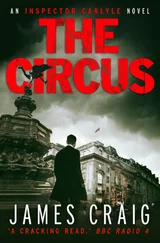I am Nichiren.
Geraty exploded in laughter. His hand struck his belly, and as it did a wind came. The dancing flame of the candle leapt and went out. The pine trees shivered, the seagulls shrieked, the sea surged above the rocks. In the darkness of a minute or an hour or all the years of his life Quin listened to the echoes of Geraty’s booming laughter.
• • •
He found the crevice under the pine trees and crept along the cliff to where the path became less steep. The wind was cold and he walked with his collar up, his back hunched. Halfway to the village he stopped and looked back.
The house was hidden. Did the Buddha sit with a candle? Did he peer through the blackness at the seagulls, the rocks, the waves?
Quin trudged along with his caravan, the lean Emperor and the small General marching to a silent stony drum, the animals in their cages, the jugglers wafting painted flutes and mingling torches in the air. Lotmann played his music, Adzhar spoke in a still, small voice, Lamereaux stroked the moss in his monastery, and Mama prayed on the lotus of her ivory elephant. The aerialist turned a somersault, the Siberian tiger pawed the ground. A brother solemnly changed his necktie, another sang across the sand.
It was a long parade and Quin walked ahead of it wearing the frock coat, carrying the megaphone, no announcement too extreme between the rice paddies and the beach, no costume too bizarre, no act of memory too daring.
He left the waterfront and climbed up the narrow street to the square beside the station. There an itinerant storyteller was setting up his stage. Children clustered in front of the empty frame.
The storyteller was so old his head shook. His tiny stage stood on three poles. He fitted a cardboard painting into the open frame, then assumed the voices of those who were shown.
First came a boy and his parents. The boy wandered along the beach and met a dragon who carried him to the emerald kingdom beneath the sea. A Princess spoke of the enchanted life that would be his if he remained there, but the boy elected to return to his home. He waved to the Princess and rose above the waves again, waved to the dragon and walked along the beach to find the trees moved, the houses gone, the familiar paths now leading elsewhere.
The boy sat down beside the road and cried.
An old man appeared who looked very much like the storyteller. He leaned on his cane in the middle of the road listening to the boy’s account of his wondrous journey. Then he explained the sad truth. One day in the emerald kingdom was the same as one hundred years on earth.
But I didn’t know, cried the boy.
No, said the old man. No, you didn’t.
The children in the square huddled beneath the stage. The tale seemed over. Now the boy stopped crying, the storyteller removed the last cardboard picture and stepped in front of the empty stage, into the frame of stars and darkness.
He was smiling. Leaning on his cane.
A true tale, he whispered. I know because once I was that boy and now I am that old man.
He nodded, the children smiled. They laughed. They shouted. They pushed back and forth and chased each other around the square as Quin walked into the station and left behind the old man with his extravagant cardboard pictures, his empty stage that had framed a shadowy figure in Mukden and Shanghai and Tokyo, in the Bronx, a clown once called Geraty.












